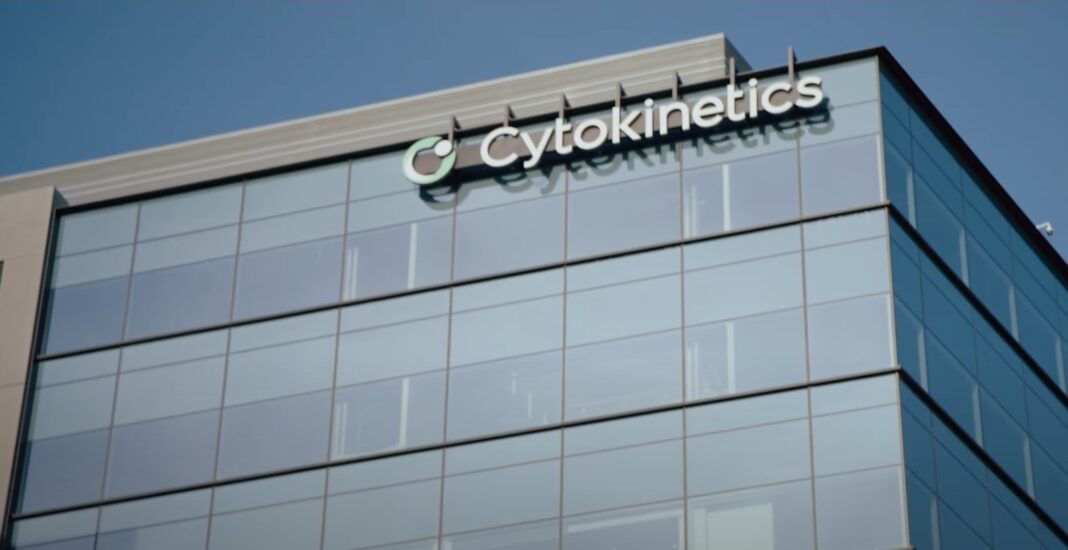The ups and downs of stock prices are often likened to a roller-coaster ride—and this past month, investors in Cytokinetics (CYTK) have seen all too well the ups, and the downs, of that metaphor.
The big ride for Cytokinetics began October 31, 2023, when Bloomberg News reported the company was exploring potential acquisition options after receiving interest in a takeover from would-be buyers, based on unnamed sources. Cytoknetics shares climbed 9% on the report, from $32.09 to $34.86, only to stay relatively flat in the low- to mid-$30s per share range for a month and a half.
The reason: Would-be buyers and investors were waiting for Cytokinetics to report data from its Phase III SEQUOIA-HCM trial (NCT05186818), assessing its selective, small molecule cardiac myosin inhibitor aficamten—the company’s lead pipeline candidate—in patients with symptomatic obstructive hypertrophic cardiomyopathy (HCM).
When Cytokinetics came through with the data on December 27, shares embarked on the steep climb part of the roller-coaster ride and nearly doubled, zooming 83% from $45.71 to $83.44. The company rang out 2023 by trumpeting positive topline results—namely a statistically significant and clinically meaningful increase of 1.74 mL/kg/min in the trial’s primary endpoint, the change in peak oxygen uptake (pVO2) measured by cardiopulmonary exercise testing (CPET) from baseline to week 24.
The company also reported statistically significant and clinically meaningful improvements in all 10 prespecified secondary endpoints, including Kansas City Cardiomyopathy Questionnaire Clinical Summary Score (KCCQ-CSS) at weeks 12 and 24, the proportion of patients with ≥1 class improvement in New York Heart Association (NYHA) functional class at weeks 12 and 24, change in provoked left ventricular outflow tract gradient (LVOT-G) and proportion <30 mmHg at weeks 12 and 24, as well as exercise workload and guideline-eligibility for septal reduction therapy.
“[The data] puts CYTK at the top of the list when thinking about strategically impt [important] assets in SMID [small-to-mid-sized] biotech,” Jefferies analyst Akash Tewari observed in a December 27 research note.
SEQUOIA-HCM is one of three Phase III trials Cytokinetics has ongoing for aficamten. The other two are ACACIA-HCM (NCT06081894), designed to compare aficamten to placebo in the quality of life, exercise capacity, and clinical outcomes of patients with non-obstructive hypertrophic cardiomyopathy; and MAPLE-HCM (NCT05767346), designed to compare the efficacy and safety of the drug compared with metoprolol succinate in adults with symptomatic hypertrophic cardiomyopathy and left ventricular outflow tract obstruction.
Estimated primary completion dates are July 2025 for MAPLE-HCM and June 2026 for ACACIA-HCM.
Climbing into 2024
The climb up continued into 2024, with Cytokinetics shares soaring over seven trading days to an all-time high of $110.25 before closing 30% higher at $108.06 on January 8, the first day of the 42nd Annual J.P. Morgan Healthcare Conference, where the company emerged as a topic of conversation, along with other takeover targets.
Half of that leap came that day after The Wall Street Journal, citing unnamed sources, reported that the company was in advanced talks to be acquired by Novartis (NVS) in a deal that “could be completed as soon as this week.” That report also included a number of keen interest to investors—a peak-year sales estimate of $3.6 billion for aficamten, as forecast by Truist Securities.
The news even sent Novartis shares rising nearly 1%, from $106.31 to $107.08.
News of Novartis’ emergence as a suitor for Cytokinetics soon led to reports of other would-be buyers entering the fray: Dealreporter pinpointed AstraZeneca (AZN) and Novartis as would-be buyers, while Reuters reported Johnson & Johnson (JNJ) as another potential acquirer, citing an unnamed source, though the wire service added that J&J and AstraZeneca were likely to be outbid by Novartis.
None of the reporting has uncovered how much buyers have bid for Cytokinetics, though the Betaville M&A deals website has reported that Cytokinetics had been holding out for between $130 and $145 a share—52% to 69% above its closing price Friday of $85.60 (up 1% from a day earlier). That range would value Cytokinetics between $12.7 billion and $14.2 billion, compared with its market value of about $8.4 billion as of Friday.
If that range being sought is accurate, it would help explain why Novartis walked away from a deal, at least for now. Buyers tend to pay above market cap for an acquisition target, especially if more than one potential acquirer has emerged.
“Sub-$5B assets,” and lower
Novartis CEO Vasant (Vas) Narasimhan, MD, told CNBC last Tuesday that his company’s overall M&A strategy “is really to focus on sub-$5 billion assets.” He cited in part Novartis’ up-to-$425 buyout of Amsterdam-based Interleukin15 (IL-15) targeted therapy developer Calypso Biotech—$250 million upfront, up to $175 million tied to achieving milestones.

CEO, Novartis
Narasimhan further narrowed Novartis’ price range for acquisition targets during his presentation at J.P. Morgan last week: “We’ll continue to really look at those deals in that sub-$2 billion, sub-$1 billion space to continue to build out the portfolio.”
Accompanying Narasimhan’s remarks was Novartis’ Strategy & Growth Update, consisting of slides outlining the company’s “Focused Strategy,” which included “bolt-on M&A.” EY defines “bolt-on” as a small- to medium-size company acquisition of up to $1 billion and less than 25% of the buyer’s market capitalization in a new high-growth area, or an area adjacent to the core existing product portfolio.
Novartis also cited as strategy elements business development and licensing (BD&L), a “strong and growing dividend,” share buybacks, and an approach of growing four core therapeutic areas—cardiovascular-renal-metabolic, immunology, neuroscience, and oncology—and five technology platforms: chemistry, biotherapeutics, xRNA, radioligand, and gene & cell therapy.
On the BD&L side, Novartis announced new collaborations at J.P. Morgan with:
- Shanghai Argo Biopharmaceutical—Up to $4.165 billion ($185 million upfront), plus tiered royalties, to develop RNA interference (RNAi)-based cardiovascular drugs. Novartis will receive an ex-Greater China exclusive license for a Phase I/IIa candidate, a worldwide exclusive license for a Phase I candidate asset, and an option to license compounds directed against up to two targets.
- Isomorphic Labs—Up to $1.238 billion ($37.5 million upfront), plus tiered royalties, toward a strategic research collaboration to discover small molecule therapeutics against three undisclosed targets using Isomorphic’s AI and technology platform. Isomorphic, which operates autonomously within Google owner Alphabet, is partnering with GoogleDeepMind to develop a next-generation iteration of AlphaFold.
From ex-partner to reported buyer
When Novartis appeared to back away two days later from pulling the proverbial trigger on a buyout of Cytokinetics, its stock dropped 16%, falling from $101.63 to $84.95, with the stock since plateauing around $85.
No sooner did Novartis reportedly hold off on buying Cytokinetics when Betaville reported that Amgen (AMGN) had emerged as another potential buyer. The companies partnered from 2006 to 2020, when Amgen terminated the collaboration, to develop two small molecule candidates with cardiac indications: omecamtiv mecarbil, a selective cardiac myosin activator developed to treat heart failure with reduced ejection fraction (HFrEF); and CK-136 (formerly AMG 594), a first-in-class selective, oral cardiac troponin activator for heart failure with potential to expand into expand to subsets of heart failure.
Omecamtiv mecarbil is under European Medicines Agency review in HFrEF, while the FDA last year rejected a New Drug Application (NDA) for the drug with a complete response letter (CRL) requesting an additional clinical trial to establish “substantial evidence” of effectiveness in HFrEF, with benefits that outweigh the risks. Cytokinetics has appealed the CRL, which also concluded that the company’s Phase III GALACTIC-HF trial (NCT02929329) was not sufficiently persuasive to establish substantial evidence of effectiveness for reducing the risk of heart failure events and cardiovascular death in adults with chronic heart failure with HFrEF.
As for CK-136, it is now in a Phase I study (NCT05662215). Cytokinetics plans to analyze single ascending dose data from the study later this year.
The would-be suitors have not commented on their interest in Cytokinetics.
Amgen, AstraZeneca, Johnson & Johnson, and Novartis are among 11 potential bidders for Cytokinetics, Mayank Mamtani, a managing director and group head of healthcare equity research with B. Riley Securities, told Bloomberg, adding that he was skeptical that a merger announcement was imminent.
“The stock volatility is hard to predict. It could go down first and then it could create an entry point,” said Mamtani, who in January raised his firm’s 12-month price target on Cytokinetics to $122 a share, the highest of any firm tracking the company’s stocks.
Leaders and laggards
- Aclaris Therapeutics (ACRS) shares tumbled 28% between Wednesday and Friday, from $1.28 to $0.92, after the company’s topline Phase IIb results from its Phase IIb ATI-1777-AD-202 trial (NCT05432596), assessing its topical “soft” JAK 1/3 inhibitor ATI-1777 in patients with mild to severe atopic dermatitis (AD), failed to wow investors. Aclaris noted that the trial met its primary efficacy endpoint of a statistically significant percentage change from baseline in the Eczema Area and Severity Index (EASI) score at week 4 for patients treated with ATI-1777 2% BID (69.7%), compared with vehicle (58.7%). ATI-1777 2% QD “showed a trend toward significance” with a result of 68.3% vs. 59.5% for vehicle—but that outcome was not “statistically superior,” Aclaris acknowledged. Jefferies analyst Roger Song, MD, CFA, downgraded his firm’s rating of Aclaris from “Buy” to “Hold” and lowered the 12-month price target 33%, from $1.50 a share to $1.
- Apellis Pharmaceuticals (APLS) shares catapulted 22% between Monday and Wednesday, from $59.61 to $72.47, after the company reported preliminary Q4 2023 net product revenues of approximately $114 million for Syfovre® (pegcetacoplan injection)—above analyst estimates ranging from $87 million to $100 million, and a 50% leap quarter-over-quarter. Syfovre is indicated for geographic atrophy secondary to age-related macular degeneration. “This sales number is a strong support that the safety concerns from the summer are largely behind them,” Baird senior research analyst Colleen M. Kusy, CFA, wrote Monday, “and bodes well for continued launch momentum.” For all of 2023, preliminary net revenues were approximately $275 million. “No buy-out (yet), but with a launch like this, we think they definitely remain a target,” Kusy added.


